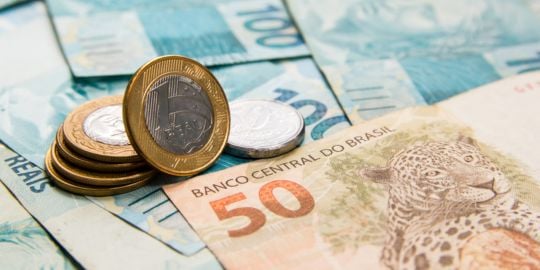I was looking at bank web sites and found a page on the Bradesco Bank site advertising the "Bradesco Personal Loan" at rates "from 3% per month." If I am doing the math correctly, that's 42%/year. WTF????? I don't think that loan sharks in the U.S. charge that much! Why are loan rates so high in Brasil? I'm glad that I don't need a loan there!
Loan interest rates in Brasil
Forget about fair rate loans in Brazil. Unless you qualify for a CAIXA''s loan, which might be your only source of affordable APR Rates, Brazilian rates, there is.
CAIXA'S funding stems from the worker's payroll deduction known as Fundo de Garantia Por Tempo de Servico, or shortly, FGTS. All other banks work on spread rates ( your equivalent to Prime or Libor + spread ).
CAIXA underwrites nearly 3/4 of the residential loans in Brazil. Banco do Brasil specializes into guaranted lower rate loans for Agribusiness. BNDES is the sole source for commercial loans on commercial enterprises, say a leasing on capital equipment or a business expansion.
Think of CAIXA as the equivalent of Freddie Mac, only the securities to bankroll are not Fannie Maes or Ginni Maes.. It's the FGTS money vault.
And then there's the relationship and your anchored assets or cash on hand with banks. You are not getting a 10% down and a 4% APR over 30 years in Brazil. Ain't happening.
Outside CAIXA, your second best try would be with the Parana's Coop Banking ( Sicredi ) on rates. Even then, on the sole account of the base rate , or Selic, you are paying through your nose.
Welcome to Brazil, and be grateful for America's World's dominance, affects the cost of money to the median American.
All other commercial banks practice the Central Bank's Base Rate+ spread. The Base rate is also known as SELIC.
Most of the money to bankroll Real Estate Development nowadays it's either private equity with their war chest, or Securitizing Firms ( a lot of them by Itaim Bibi, and some other places ).
if you are not getting your bank loans from CAIXA, then, what you ought to be doing is to get funding through Real Estate Syndication and Coop Groups.
And, outside of a short supply of cheap money, therefore creating a cartel like structure for money supply, rates of delinquency in Brazil tend to be high, and from time to time sweep new banking concerns ( Citi, HSBC, Credit Lyonais, Paribas, etc). So as result, your cost of lending tends to be spread on higher margins to make up for foreseen losses on delinquencies.
and by the way...
Local securitizers do not work with Mortgages as an investment product. Securitization is done as to ensure the Real Estate Developer meets capitalization mandates to build.
Now, in combing through Sao Paulo's property tax records ( up to 2020 ), there is a pattern, on older building projects ( beyond 10 years ago ) for the recurrence of Developer's Direct Lending on home financing.
This was probably to facilitate sales at a time the cost of money was prohibitively high.
And before Brazil's runaway 1980-90's inflation it wasn't uncommon for buyers to get seller direct financing or buying land plots or homes. Inflation ate any prospects of a decent returns to direct lenders, so the practice was completely abandoned.
There are recent direct financing deals, but you are going to pay top tier loan rates for the sake of built in risk.
@sprealestatebroker I don't need a loan...thankfully! But, with those exhorbitant interest rates, I can't help but wonder why someone isn't giving loans at 1% or 2% / month. That's still an annual profit of 12% and 26%, respectively. Most investors would kill for that kind of return. A real estate attorney in Brasil just told me that the interest rates are so high for two reasons: 1) high default rates and 2) there are few banks, so there is little competition and the banks collude on setting interest rates (illegal but not enforced), so there is really no competition....mostly due to reason #2. If that is true, what is to stop someone from setting up a loan company to offer better rates?
exactly my point.
there is no justification for such absurd rates, the highest in the world, other than the greed of the Brazilian banks owners...
nearly all the richest people in Brazil are the family of the bank itau founders...
the situation is totally disgusting... rich people pay cash everything, like the family of Bozonaro paying cash for houses/apartments. .. only the poors do loans... the situation is just another way to keep the poor far away from the "decent white rich" folks, folks controlling all the politics, the land, the industry... the poor people, mainly blacks are still considered almost as slaves...
welcome to another side of Brazil... the situation is not so different from the colonial times...
- Supply and demand.
- Base rate the Central Bank Charges changes what commercial banks charge.
- High Risk factor in Brazil with above average delinquency rates. Often times, some banks go belly up for betting big on consumer loans.
- Even CEF-Caixa Economica lower loan rates feature a huge REO portfolio. Safra has the lowest REO portfolio.
- It's cheaper to park your money on fixed rates than actually put it to work on loans. Shisters and Loan Sharks have a hard time making a go in Brazil. My deceased used to to lending, it was a nightmare making collections on short term loans. The term for Loan Sharks is Agiota, FYI.
- Better sell the whole building and making a go to Real Estate Syndication.
- The highest rate of loan underwritings is CEF, since they subsidize their loans to a level no other commercial bank can match. As I wrote before, they draw their funding from FGTS ( payroll deduction and compulsory rainy contributions, not quite Social Security ) . No other bank can.
01/31/23 Loan interest rates in Brazil. Before anybody goes off the deep end about family cartels controlling interest rates, Deep State conspiracies, or anything related, they should carefully re-read everything that sprealestatebroker has written above. And then consider some additional facts.
The two biggest banks in Brazil, Banco do Brasil and Caixa Econômica Federal (CEF), are owned by the government -- no rich families behind the scenes, exploiting everybody else. The commercial banks get the customers that those two don't choose to compete hard for: if they really wanted that customer base, the government would rewrite the rules to make sure that they got it. They're the market leaders, both by fiat and in fact.
The current SELIC is 13.75%. The published rate of inflation is 5.79%, and we all know that it's probably higher. (source: https://www.bcb.gov.br/en). That means that the lowest possible cost of money theoretically available to a bank to re-lend, a rate that would give the source of funds no profit and no offset to its own costs, just some guarantee of not losing value on the principal, is 19.54%. The SELIC is where it is because Brazilians are snakebit about inflation, with good reason: they lived with it constantly from 1929 to 1994. It's in the memory of too many people still alive for the Banco Central to risk really loose money.
Why aren't private loan companies taking up the slack? They are to some extent, but when their own cost of money is going to be somewhere north of 20%, there's not a lot of spread for them to finance themselves on. No one -- except the government for favored industries through BNDES -- is going to lend money at a loss. Maybe having more banks in the market would help some, but they'd still have to get their money from somewhere, and as sprealestatebroker has noted, the only bank with a guaranteed source of cheaper funds is CEF. And all of this is before we even discuss Brazil's default rates on loans, or the fact that the real estate market is weak in many states, and shows no strong signs of recovery. Lending money is a high risk, low reward game in Brazil, and that makes it a seller's market that I for one don't see changing anytime soon.
Lula is quoted this morning as complaining about the high rates of the central bank and saying that their targets may be too low. And he is talking about all kinds of new spending which will further stimulate inflation. And he mentioned recently that he is looking into a joint currency and trading agreement with Argentina. Take some time to check out Argentina's currency history. And look at what is going on in Bolivia, in Peru, and Equador, and Colombia right now. These kinds of developments do not bring comfort and joy to bankers......
Joint currency with Argentina... Pie in the sky.
They haven't been able to work the Mercosul in ages , the Argentines are often practicing dumping, circumventing the rules. Besides, Argentine money is worth diddle, and so is the Brazilian money.
Just another act for the press and public, and another attempt to buck the dollar.
Not happening, and if so happens, watch the dollar soar on the Forex on the sole account of demand.
02/01/23 Joint currency with Argentina... Pie in the sky.
-@sprealestatebroker
I agree. I think that Lula's whole charm offensive with the President of Argentina can be summed up in Lyndon Johnson's classic observation (somewhat edited here): "I'd rather have him inside the tent peeing out than outside the tent peeing in." Gotta keep peace in the neighborhood because Argentina's not going anywhere and it can create all kinds of annoyances for Brazil if it becomes seriously disgruntled, but fortunately, it can be placated by being treated like an equal, by hosting the First State Visit of the New President, and by talk about things like "joint currencies". There's a whole lot less there than meets the eye.
The European Union has membership rules.
Sometimes not for the better in separate events/circumstances, but all the nations that joined the Union agreed to the rules in the first place.
The common currency for one, prevented members for manipulating their currencies, created a large common market, free flow of people and shipments within the union, and subsidies or loans were earmarked for countries that needed to catch up with the rest.
A good example, were dairy quota allotments. You can't dump your lower cost surplus on other member countries. Portuguese Dairy Producers learned this, and were given subsides to buy their production. What did not go into milk, went into specialty dairy products, such as local cheese, which would an export item outside the Union.
The Union also created fiscal mandates on how each member country used loans and subsides, in order to avoid fiscal abuses. In hindsight we all know how it went. Greece, Spain, Italy had their own issues, and then the EEUU had to bail them out ( read Germany opening up the purse ). Portugal somewhat managed to allocate the windfall where it was due. Better roads, increased birth rates, education.
On the flip side....
The Argentinian Government, for one, wanted out of Mercosul, when rules of engagement were toughened up or simply applied where due. Now, they might be coming into a windfall, on the account of Lithium Reserves, and Gas & Oil Fields.
Nonetheless, this is Argentina. The Country that goes into default to its sovereign loans every once in a few years like clock work. They keep voting on the same idiots that milked the Country dry, say hello to Christina Kirchner.
You can't take the Argentinian Government for what it is worth. This proposed alliance is so flawed, Chile, Peru, Uruguay, Colombia, Ecuador want none of it.
Bottom line, there is no currency, at this stage of events, that can replace the Dollar.
And by the way, you can lump the BRICs proposed common payment in the same file. Pie in the sky.
Brazil has been trading outside the dollar for quite a while, US sanctions aside. There's a reason why, the Brazilian Government, be it Bolsonaro's, or Lula's, did not side with Ukraine. We need all that Russian Potash and Fertilizers we no longer make.
At some time in the past,, all of that stuff used to be made on the Cubatao's basin. With all the Environmental mandates imposed by CETESB to enforce smokestack filters, Fertilizer makers couldn't make it clean enough. The released by product literally burned swatches of Serra do Mar's forest cover on the hills. it was bad enough that landslides occurred with some frequency.
We done away with those facilities.
now...
Russia has no issues in coping with environmental mandates. If the stuff does not pollute Moscow, St Petersburg or Vadivostok, no one will bat an eyelid there. They can place the plant anywhere close to raw materials and load onto trains. If mil town workers suffer the adverse effects of pollution, no one will care, lest the Russian Government.
Brazil is by and large, a huge Agri Business Conglomerate, whose country depends on exporting foodstuffs, animal feed, meat the world over. When Bolsonaro, on his sucking up to Trump rant went all against iran, he was called on the mat by his backers, all from the Agribusiness Complex Lobby.
And adding a twist of past and current events....
just as we did with pre-US invasion Iraq, as we do with Russia, we bartered and traded off the dollar. Back in the 80's Sadam had oil, we worked a barter trade with him. We sent us his crude , he got frozen poultry,, ships full of VW Passat ( https://en.wikipedia.org/wiki/Volkswagen_Passat the B1-5 models for anyone who would care, the green four door sedan ), and we sent engineering firms to build dams and roads.
That's how it works folks.
Lula is a swell guy, but from time to time, he is prone to have these harebrained ideas.
This thought left incompete...
Brazil is by and large, a huge Agri Business Conglomerate, whose country depends on exporting foodstuffs, animal feed, meat the world over. When Bolsonaro, on his sucking up to Trump rant went all against iran, he was called on the mat by his backers, all from the Agribusiness Complex Lobby.
Iran is, a large importer of our beef exports. It turns out, more than the US.
Bolsonaro was told to shut up and change the rethoric. Which he did.
@abthree
Whatever the reasons for the high interest rates in Brazil, as my Brazilian/American friend told me many years ago when I was first considering moving to Brazil, “Bring lots of money”. 😀









